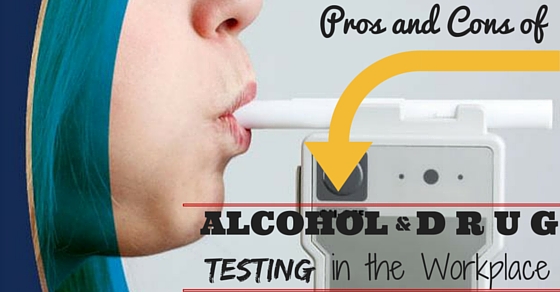Alcohol and drug abuse have been sharing the limelight ever since the beginning of 20th century. It would not come out as shocking if two out of five are active abusers. However, the numbers of passive victims are not limited. Roommate, friend, or elder siblings, may bring home and share the addiction with you easily. With more underground access to such materials, it has become easier for the people to opt for alcohols and drugs. The addiction may simply start from once a month scenario to 6 hours everyday period. A bitter painful truth is that day-by-day many people have wrapped themselves into the web of addiction. This habit of abusing may not only affect the person physically and mentally but also professionally.

Employers carry out drug and alcohol testing in the company at various periods. It is indeed a necessity in today’s time. However, there are countries, where the law denies the right of drug testing to the employer. Once the employer is enabled to carry out drug tests, he or she follows a certain pattern to ensure healthy workplace. Let us have a look at drug test conducting periods.
Drug and Alcohol Testing Periods in Workplaces:
Employers opt for drug testing in their company at certain interval depending upon the policy contract signed by the employees. Drug tests can be conducted through blood, urine, breath, hair strand, etc.
1. Before employment:
Rate of illegal drug use have been increasing at a hyperactive rate. It would not come as shocking if your fellow colleague is stuck under the web of drug consumption. Therefore, employers make sure to hire individuals who do not abuse drug or alcohol on regular basis. However, this test is usually conducted after an employee is offered a job. It is a prerequisite process. However, the law at some places strictly demands that the employer should not conduct unannounced tests on the candidate. This method may not affect the recruiting however, it enables the employer to take necessary steps to control the situation and recruit a healthy staff. Moreover, the candidates are informed about the condition that if they fail the test they might lose the offer. Therefore, on the part of the employee, there is a loophole in the system. The candidate might stop the drug usage for a certain period so that the test might appear clean.
2. The eye of suspicion:
The loophole of the ‘pre-employment’ stage may help you in getting a clean chit in the drug test. However, after gaining a certain job, if the employee persists on abusing drug then he or she might get in trouble. The eye of suspicion refers to the observer. Intake of drugs or/and alcohol can make you a bit slower in understanding, processing and reacting. Thus, in such condition the observer may look out for signs and symptoms that might prove the guilt. However, the employer should set down a guideline or set of rules that defines the drug induced behavior. Moreover, this suspicion is based on the manual observation and may suffer subjective attitude or misconception. Thus, it is advisable to make a clear observation, several times before conducting the test. During the period of awaited results, the employee should not come for work. (If at all the tests are positive, this may save possible workplace accidents.)
3. Employee impairment or drug induced accidents:
In this condition the employers conduct the tests after any fatal or non-fatal incidents take place in the company. Firstly, the investigators carry out an investigation to check whether the accident was manual fault or not. If the results prove it a manual fault then the employee is subject to drug test. The employers make it mandatory drug testing in the workplace and test within 24 hours of the incident. The composition of drug remains cannot be found long after the consumption. Specific guidelines should be mentioned in the policy so that the employee has no chance to postpone the test due to the incident-induced shock. However, positive result does not mean that the blame should solely be on the employee.
4. Lucky draw method:
Lucky draw is not a new concept. Well, the random drug testing in the workplace lucky draw method is another way of drug testing. It is conducted on a random day on unannounced basis. Employee number are collected and placed in for pool selection. Those numbers that are selected from the lot are subject to the test. This process is computer generated and thus, it is 100% random in nature. This test definitely comes with no loopholes apart from the luck factor.
5. Timely scheduled tests:
Timely scheduled tests take place as mentioned in the policy. It is uniformly accepted method by the employees. However, this test enables the employee to manipulate their drug level by restricting the consumption before a week or more from the day of analyzing.
6. Back to work:
Back to work, analysis is for the employees who were previously detected as drug abuser. This test usually takes place once the employee returns from the rehabilitation centre. This test ensures that the employee is not again wrapped up into the web of addiction.
7. Others:
Apart from the above tests, drug tests are conducted in the organization under various circumstances. This may include back from illness tests, less attention span, motor skill disability, etc. These tests may be unannounced and unpredictable.
Thus, regardless of the law various employers use the policy in their sector. Moreover, these tests ensure the healthy nature of the workplace and reduce the odds of incidents. However, it is necessary that the rights of the employees should not be violated in the process. Let us have a look at the ethical principles of drug testing workplace.
Ethical Principles:
1. Mutual consent of the subject:
Employees who are selected for the last stage of interviews should be informed about the drug and/or alcohol testing. Moreover, they should be informed about the circumstances in which they may be subjective to the test.
2. Privacy:
Privacy and confidentiality is of utmost importance to the employee. Regardless of the result or any suspicion, the employee must be treated with respect.
3. Irrational suspicion:
Stress and inattentive behavior can be induced due to high workload, tough project, difficult clients, etc. Thus, these symptoms should not be counted as the signs of suspicion. Suspicion based on such symptoms may come off as offending.
4. Second chance:
There is no guarantee of the accuracy of drug analyzing tests. Thus, on obtaining a positive result, candidates should be given the change to speak in their favor or give a valid reason for the result.
5. Support:
Along with respect, the colleagues should not look down upon the employees with positive results. Moreover, the company should provide necessary support and rehab program.
6. Justifiable ground:
Drug testing results should not affect the employment of the employee if he or she does the mandatory work properly. Moreover, taking away the chances of employment would not benefit either party. Thus, instead of hiring a new candidate and go through the process of recruiting, the employer should opt to provide them the appropriate help.
Regardless of the ethical principles and the objectives of alcohol and drug testing in workplace, it has various advantages and disadvantages. Let us have a look at the pros of alcohol and drug testing for workplace.
Pros of Alcohol and Drug Testing in the Workplace:
1. Risk of unemployment:
Regular drug testing brings along certain benefit for both, the employer and the employee. Due to the risk of unemployment and detection, the employees try to lessen and slowly stop using drugs altogether. As a result, the odds of positive result decrease on regular basis.
2. Healthy and safe working atmosphere:
Carelessness can bring along many possible accidents. Be it a huge bulky industry or a small-scale company, carelessness can ruin the on-going work process. Drug or alcohol consumption can decrease the attention level and can cause various problems. By regular drug test, employers can assure a safe environment to work for the employees.
3. Financial obligations:
Compensation is the biggest financial obligation in the life of the employer. Compensation based on the accident or injury while working may not only take a toll on the capital but also the name and reputation of the company. On drug induced accidents and injuries, the employee is less liable to file a complaint or compensation. Thus, at times like these drug testing in the organization may prove to be benefit.
4. Time savior:
Recruiting is indeed a time consuming task. An employee, who has been working in the same organization for a long time is a big asset for the company. However, if the employee gets addicted to drug or alcohol, his or her performance decreases. Moreover, if the company removes him or her from the job then it has to go through the time consuming process of recruiting as well as training. Hence, due to drug testing available in the workplace it is easier for the company to provide necessary support to the employee and benefits from the experienced employees. On the part of the employee, he or she experiences new hope and freedom from addiction.
Hence, we can conclude that there are various benefits of drug testing employees. However, the cons of drug testing are not far behind.
Cons of Alcohol and Drug Testing in the Workplace:
1. Costly investment:
Drug testing may cause a lot of investment. Various drug-testing kits come at different prices however; there performance might differ according to the rate. Moreover, these kits cannot be stored for a long period hence; wholesale import would not be beneficial. Further collecting various samples may also be much of headache. Moreover, some lab tests may also be very expensive. Thus, there is a lot of investment in drug testing.
2. Privacy intrusion:
Random drug tests are conducted on no stiff grounds. Thus, they may come of as an intrusion for the employees, as there is no such reason for the employer to conduct the testing. If the workplace condition is not affected due to the consumption or addiction of the employee, the employer should not take any negative actions against the employee. Moreover, urine and blood tests can only portray the history of the drug intake and the recent status. Hence, it becomes difficult for the employer to stay away from the compensating fees.
3. Employee rights violation:
If at all an employee files a case against the company based on the employee rights violation, then the company may suffer. It would not only affect the usual working schedule but also the capital that will be invested in fighting against the plaintiff. Moreover, bad publicity is very dangerous in the corporate world. Thus, even when the plaintiff loses the case, the company suffers lose too.
4. Privacy and confidentiality:
Drug testing results may not only affect the company as well as the life of the employee. Thus, companies make sure to give the responsibility of observation to one of the fellow colleague. This is to prevent tampering to any evidence. However, this may cause trust issues between the colleagues. Moreover, it may also violate the condition of privacy and confidentiality, as mentioned in the testing policy.
5. Non-accuracy in results:
Drug testing reports do not guarantee any accuracy. Many reports prove that a little error in the accuracy may cause a massive difference in the result. For example, if a non-addictive person-receiving positive result, may not anymore trust the organization and its testing method. This may not only affect the personal relationships but also turn into a rebellious movement.
Thus, there are various possible pros and cons of drugs and alcohol testing in the workplace. However, it is subjective for the company to opt for the testing method. Among various options available for testing, it is necessary for the employer to look out for trustworthy testing and be clear with the employee rights and company policy.








































I really liked you section about the ethical principles of conduction drug tests on employees. I agree that there should be mutual consent between the employer and the people working at the company. I also appreciate your stance on finding appropriate support groups or rehab facilities in the case that a test comes back positive. In my opinion, this shows respect for the employee, even if they must be fired from their job.